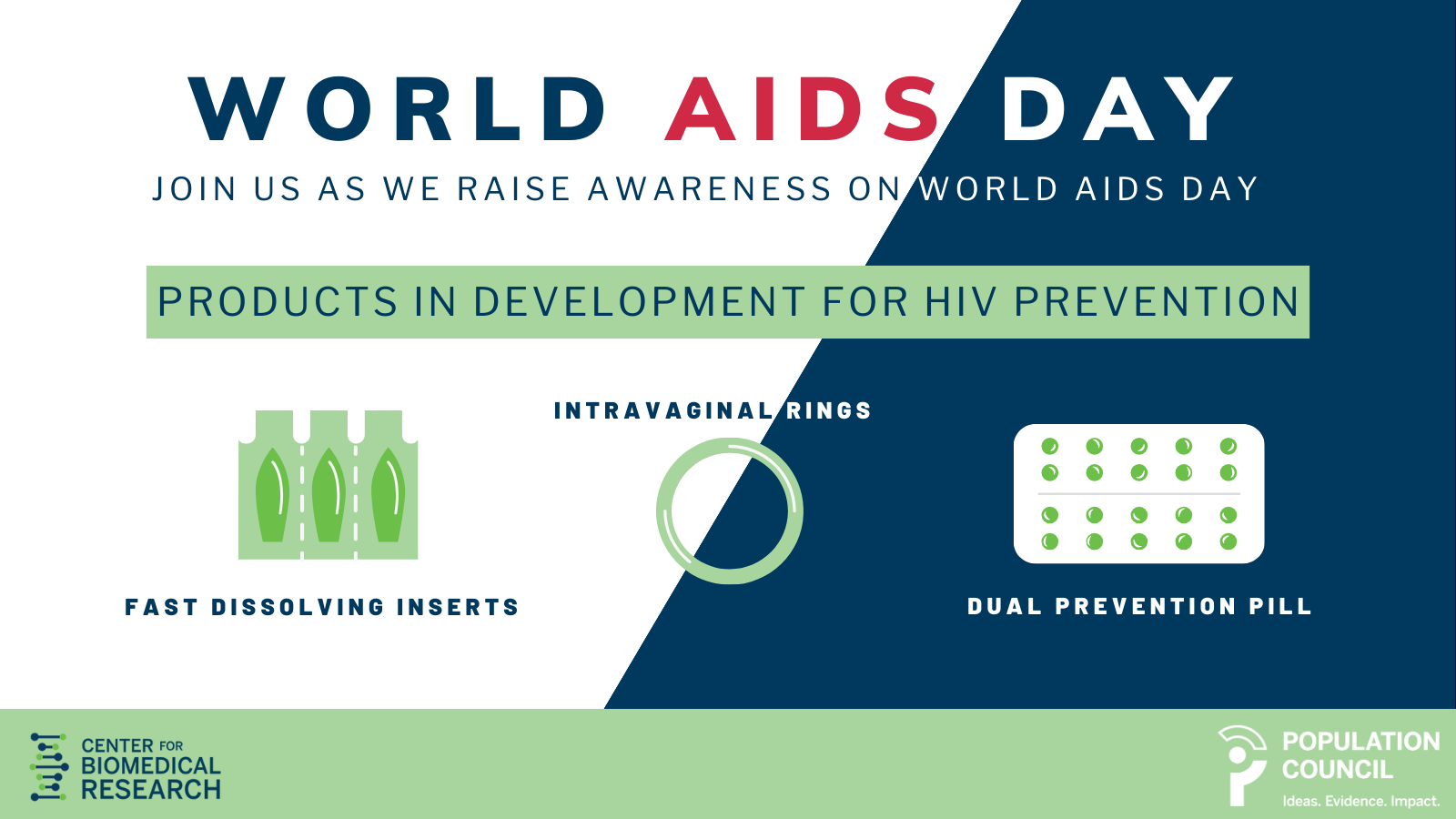
The Population Council’s Center for Biomedical Research began research on the sexual transmission of HIV in 1986. For over 35 years, the Center has remained dedicated to conducting research and developing products that can reduce the global burden of HIV. In parallel, we work with the Population Council’s social and behavioral research scientists around the world to ensure that end-user and provider perspectives are incorporated throughout the drug development process.
The Center for Biomedical Research has multiple HIV prevention products within our product portfolio, including a dual prevention pill, two intravaginal rings (including one hormonal ring and one non-hormonal ring), and two fast-dissolving inserts (including one contraceptive and one with broad-spectrum STI prevention). In March 2023, we published results of a global internet survey that explored women’s opinions about multipurpose prevention technologies in development, which found that 82% of respondents preferred to use a contraceptive multipurpose prevention technology versus HIV/STI prevention alone. In April 2023, we hosted an interactive webinar discussing the history of microbicide development at the Population Council, from articulating the potential for a female-controlled HIV prevention method in the 1990s, to our work today on the dapivirine vaginal ring, the first-of-its-kind vaginal ring for protection against HIV.
The Population Council commemorates this year’s World AIDS Day, with the theme of “Let Communities Lead,” by sharing a snapshot of three of our HIV prevention products; the dapivirine vaginal ring, the Griffithsin fast-dissolving insert, and the dual prevention pill. For all three of these HIV prevention products, the Center for Biomedical Research and IPM South Africa, an affiliate of the Population Council, partner with diverse set of stakeholders in low-and middle-income countries and incorporate the opinions and preferences of end-users to ensure community voices and leadership are at the forefront of product development.
Dapivirine Vaginal Ring
Within our approved products, the Council is working on the introduction of the dapivirine vaginal ring (DapiRing™), a one-month, user-controlled vaginal ring to reduce the risk of HIV transmission during vaginal sex. The DapiRing received a positive scientific opinion in July 2020 from the European Medicines Agency for use among women ages 18 and older. The ring has received regulatory approval in several African countries with additional applications pending and planned for 2024. The ring has also received Prequalification status and a recommendation from the World Health Organization. The DapiRing is currently being sold by IMRES B.V.— the Council’s partner for initial global distribution.
In October 2023, results of the Microbicides Trial Network study (MTN-034/REACH), a randomized trial of nearly 250 adolescent girls and young women in South Africa, Uganda, and Zimbabwe to test adherence, safety, and choice of oral pre-exposure prophylaxis (PrEP) versus the dapivirine vaginal ring for HIV prevention, were published in The Lancet HIV. The trial demonstrated high motivation for use of HIV prevention among adolescent girls and young women, and that client-centred, non-judgemental, and flexible adherence support strategies can facilitate high rates of adherence to both oral PrEP and the dapivirine ring. A commentary, also published by The Lancet HIV, helps outline the significance of these findings as they contribute to a new era of HIV prevention.
Griffithsin Fast-Dissolving Insert
The Population Council is developing a Griffithsin fast-dissolving insert (FDI) as a non-antiretroviral HIV prevention product for women and girls, including pregnant and breastfeeding women. The Griffithsin FDI is designed to be inserted vaginally prior to sex as an on-demand, user-controlled prevention technology. The FDI, which is in early development, has also demonstrated potential for prevention against herpes simplex virus (HSV-2) and human papillomavirus (HPV) in pre-clinical studies. Initial clinical studies have demonstrated an excellent safety profile when Griffithsin is delivered as a gel, a precursor product to the FDI.
In September 2023, the Population Council signed an agreement with SwiftPharma, a Belgium-based manufacturer, for the plant-based manufacture of Griffithsin that will further the Council’s development the FDI. Development of the Griffithsin FDI is funded by the German Federal Ministry of Education and Research through the KfW Development Bank and MATRIX, a United States Agency for International Development (USAID) Project to Advance the Research and Development of Innovative HIV Prevention Products for Women. Building on favorable outcomes in in vivo models, the current funding will support research to advance the FDI through preclinical studies for its primary indication for HIV prevention, development of a final formulation, and evaluation in Phase 1 trials.
Dual Prevention Pill
A dual prevention pill is currently in development for contraception and HIV prevention. This novel daily pill will combine oral PrEP, for protection against HIV, with an oral contraceptive for prevention of unintended pregnancy. A dual prevention pill (DPP), which combines two marketed and approved products, is likely to be the fastest pathway to contraceptive multipurpose prevention technology introduction.
In preparation for market introduction, the Population Council has completed two qualitative studies with the University of Zimbabwe and Wits RHI in South Africa to assess the opinions of healthcare providers and women on the DPP. In addition, the Council implemented two clinical crossover studies at the same sites to test the acceptability of an over-encapsulated version of the DPP as a proxy for a co-formulated tablet among women ages 16–40. During these trials in Zimbabwe and South Africa, women were assigned to two regimens; three months of using the over-encapsulated DPP and three months of using two separate pills (oral PrEP and an oral contraceptive) to compare acceptability, preference, and adherence of the two regimens. Data collection was completed in Zimbabwe in September 2023 and will be completed in South Africa later this year. These studies will provide the opportunity to test out counseling strategies, learn which women prefer the DPP versus two separate pills, and prime the community for scaling up this new technology once the co-formulated DPP is available.
